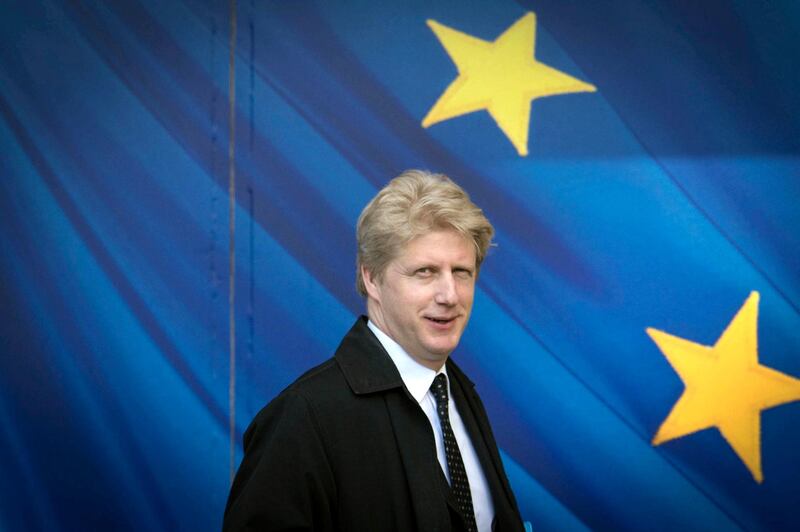Less flamboyant than his brother but still capable of a deadly turn of phrase, Jo Johnson, Boris's brother, quit as a British transport minister on Friday in rebellion against an "incoherent Brexit".
As pressure reaches a peak in the Brexit negotiations, Britain is as divided as ever on its future. Boris, the former foreign secretary, is a passionate leaver, while Jo is an equally passionate remainer.
These family tensions raise the question of why the hostility between remainers and leavers remains so intense more than two years after the June 2016 referendum result to leave the European Union.
Leavers believe that the UK must wrest control of its destiny from the shared enterprise that is the EU. Remainers believe that the decision to go it alone will cast the country to the wolves at a time of rising nationalism and international discord.
Many, including Jo Johnson, are demanding a second referendum, which would give voters the opportunity to halt Brexit in its tracks.
With politics deadlocked and each side insisting that its viewpoint must prevail, a second vote has a certain simple appeal.
Theresa May is in grave danger of being upended by an unholy alliance of both factions. Her painful crawl towards a real-world compromise with Brussels seeks to provide a patch to get over the rapidly approaching deadline for Britain’s departure. That date is March 29, 2019, exactly two years after Article 50 was formally invoked.
The urgency of the time frame matters little to the remainers or the leavers, as their battle over Brexit rages on more or less detached from the process itself.
But the point at which reality will bite is finally arriving. While the remain camp opposes a hard Brexit, its position is mostly likely to achieve precisely that outcome.
The drive for a second referendum claims that Britain can, at any time, stop or suspend the process of Brexit. This would grant the UK government time to organise a second referendum.
A court hearing at the European Court of Justice this month is set to consider whether Article 50 can be suspended or withdrawn. It is likely to find that it can’t.
In all but the most improbable of scenarios, March 29 will mark the end of Britain’s 45-plus years in the European Union. The Brexit games will be over. To throw so much energy into campaigning for any other outcome is as deluded as attempting to turn back the tide.
Clinging to the hope that the EU member states will agree to stop the process in order to facilitate a second referendum is little short of madness.
The big powers have resolved that Brexit will happen and they are keen to disadvantage Britain on its way out of the door.
Leavers are so dedicated to an absolutist version of Brexit that they are impervious to its dangers. As more revelations emerge about the murky funding of the unofficial but highly influential Leave.EU campaign, proponents of the UK’s departure are ever more zealous in their demands for a hard and uncompromising split from the bloc.
No warning is too stark to change their minds. Arron Banks, the businessman who bankrolled Leave.EU, faces increasing questions over the provenance of the funds he handed over to the campaign. Given his personal ties to Russia, the finger of suspicion points to The Kremlin. Mr Banks strenuously denies this, asserting that the resources were generated by his UK businesses, primarily insurance operations.
It is a measure of the controversy surrounding Leave.EU that the normally ebullient Mr Banks questioned if it would be better to have lost in 2016. He has said that that “demons” have been unleashed by the result.
Tomorrow, Europe marks the centenary of the armistice that ended the First World War. The negotiations that preceded that moment were carried out in a French railway siding, not far from the battle lines. France demanded Berlin’s capitulation and reparation payments. Britain demanded German arms and its entire Navy, which was then scuttled in the North Sea. The Kaiser’s chief negotiator agreed to these conditions. In response, he was assassinated by a member of a right-wing terror group in 1921.
In many different ways, the shape of Europe is being altered again today. France and Germany are leading the process of carving Britain out of the current EU framework. Mrs May and European chief negotiator Michel Barnier hope to announce the outcome of their talks within days.
Agreement provides a path for a British exit from the EU that keeps the lights on. Britain remaining in a customs union with Europe will serve to preserve much of an economy highly integrated with its European neighbours.
However, caught between the jaws of the rival camps, Mrs May cannot be confident that logic and good order will prevail.





